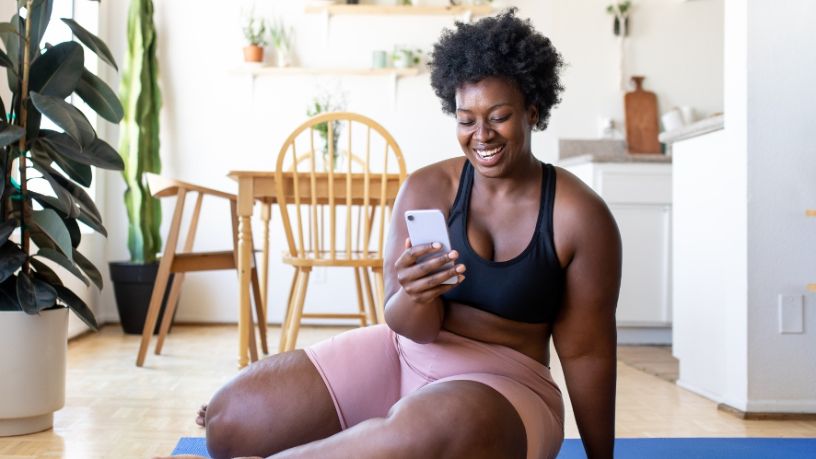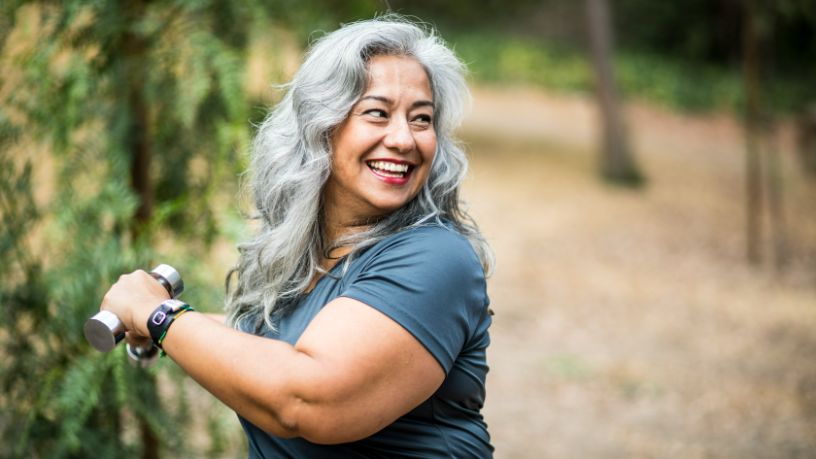Self-care is important, but where do you start?
Key takeaways
Learn about Kath Ebbs’s mental health journey.
Kick-start your self-care routine today with Kath’s top 5 tips.
Over the years, I’ve had my mental health struggles. And in that time, I’ve learned (and continue to learn) new ways to nurture, protect and love myself.
For me, self-care is about establishing a routine that makes me feel good on the inside. These tips can help inspire you to inject some positivity into your life while creating and maintaining your own healthy, sustainable version of self-care.
1. Choose an inner circle that respects and values you
It's important to choose people in your life who you want to surround yourself with, and who value the same things as you.
You want friends who truly accept you for who you are and respect your boundaries. With my friends, I don't need to explain myself half the time because they just know and get me. I can say, for instance, ‘I'm not coming out tonight’. And they won't ask me why. They’ll just say, ‘Okay’, because they love, accept and get me.
I always feel loved, supported and nourished by my peers. And so should you.
2. Follow and unfollow wisely
Many of us spend our lives scrolling through social media. So, it's important to curate an environment that makes you feel good about yourself.
Remember, what you consume on social media can affect how you think and feel, even if you don’t realise it. For me, using social media wisely means following and unfollowing certain accounts based on the way they make me feel.
I’m very intentional about who I follow on social media. I like to follow queer creators, body positivity creators and people who don’t make me feel ashamed about my mental health. When I follow accounts that talk about these issues in a way that’s non-taboo, I feel better about myself. I feel more empowered to go out into the world and set boundaries to help my mental health.
So, if someone's account is not making you feel good about yourself, a simple ‘unfollow’ (or cheeky mute) is probably the best solution.
[Kathleen Ebbs sits in a room with a brick wall behind her]
Kath Ebbs: Hi, my name is Kathleen Ebbs. My pronouns are they/she and I am partnering with Bupa today to share my top five tips for self-care.
I would just like to acknowledge the Wurundjeri people, the traditional custodians of this land in which this series is being filmed, and I pay my respects to elders past, present, and emerging. Always was, always will be Aboriginal land.
[On screen text: Self-care tip #1: Surround yourself with the right people]
My first tip is deciphering the people you choose to surround your life.
This is something I really learnt when I was like 18 years old, how important it is to have friends and an inner circle that really and truly accept you for who you are and respect your boundaries.
I know for me personally, with my friends now, I don't need to explain myself half the time because they just know and get me, and I can say like I'm not coming out tonight, and they won't even ask questions. They would just say, "OK," because they love and accept me and get me.
Therefore, I always just feel love and supported and nourished by my peers, so I think it's really important to intentionally choose the people you want to surround yourself with and make sure that they value the same things as you.
[On screen text: Self-care tip #2: Be careful of social media]
My second tip would be choosing your social media wisely.
For me, that is following and unfollowing and muting certain accounts depending on the way that those accounts or people online make me feel.
I'm very intentional about who I follow. For me, I like to follow queer creators, body positivity creators, and people that really help me feel not ashamed about my mental health.
My anxiety and depression and stuff like that. When I follow accounts that talk about those things and make them non-taboo, I feel better about myself and I feel more empowered to go out in the world and set boundaries in order to help my mental health.
I also think if you're looking at someone's page and it's not making you feel good and it's making you compare yourself or just feel inadequate, a simple unfollow is perfect.
If you can't unfollow that person for whatever reason, we love the mute button. Mute that person. You don't need to have them come up and make you feel a certain way, and they don't even need to know about it.
So yeah, making sure that you are following accounts that make you feel good and seen and heard, and unfollowing or muting people that bring up negative emotions or feelings inside of you is super important.
I think we don't realise how much what we consume and see every day, a lot of us spend a lot of our life scrolling through different social media apps, so it's really important to make sure you curate an environment that makes you feel good about yourself because that stuff goes in, and it really affects the way you think.
Even if you don't think it does, it does.
[On screen text: Self-care Tip #3: Don’t judge your own thoughts and emotions]
My third tip would be from personal experience: not judging thoughts and feelings and emotions when they come up.
I grew up suffering pretty badly with mental health issues, and the worst part of that for me was the shame that would come with that.
So now, as a general rule, I don't judge feelings and emotions when they come up or if I'm going through a period of struggling with my mental health, I just accept it and almost lean into it because the worst part about feeling crappy is feeling crappy about feeling crappy.
So, the best thing you can do is just learn to love on your emotions, and accept them, and ride the wave, doing all the things in between in order to help mobilise them.
But do not judge the thought or the feeling as it's happening because a lot of the time there's not much we can do about that. So, the best thing to protect yourself is to accept it and almost love on it.
[On screen text: Self-care Tip #4: Stay active!]
My fourth tip would be incorporating movement into your day-to-day life.
Now don't freak out; that doesn't mean working out or exercising in that kind of way.
It might be for you. For me personally, I kind of love it, but it does not mean that at all.
Incorporating movement into your life can look so many different ways. It could be literally in the morning, walking to your favourite coffee shop and having a nice little stroll listening to your favourite music. That could be your movement.
It could be bike riding. I know for me, incorporating movement into my day-to-day life has helped establish a really beautiful self-care routine and also stay on top of my mental health.
So, whatever that looks like for you, I would definitely encourage incorporating movement into your day-to-day life in order to help you feel good.
[On screen text: Self-care Tip #5: Focus on the things that make you, you]
My last tip would be finding activities and things that make you feel you.
For me personally, that is incorporating creativity into my life where I can.
Things like dancing, writing, I personally love to journal and write. That's how I feel the most in my body, and I get into that flow state. We always hear people talk about, like, your flow state, and that looks different for everyone.
But I like to think of it as what activities can I do to help me feel the most myself.
That for you could be things like moving maybe, or drawing, or rock climbing, or painting. Whatever, there are so many things I could say, whatever that activity is for you, find it and harness it, and use it to get grounded in your day-to-day life.
So, they're my personal tips on self-care.
Take what you will.
These are the things that I personally like to do in order to help establish routine and feel good inside.
And I hope it has given you a little bit of inspiration to inject some positivity into your life.
Look after your brain.
3. Don't judge your own thoughts, feelings and emotions
Sometimes, the worst part about feeling crappy is, well, feeling crappy about feeling crappy.
For me, the worst part about growing up with mental health issues was the shame that would come with it. But I’ve learned from personal experience to not judge my thoughts, feelings and emotions when they pop up. Because, at the end of the day, there isn’t much you can do about them at the time.
These days, whenever I’m struggling with my mental health, I just accept it and almost lean into it. The best thing I can do is love my emotions, to accept them, ride the wave and do all the things in between to help ease them in the right direction.
Are you in need of urgent support?
We've put together a list of services for free support that's relevant to where you live, and what you're going through.
4. Move every day
Incorporating movement into your life will make a huge difference on your mental health, and it’s a cornerstone of any self-care routine.
While you might be a gym-5-times-a-week kind of person, moving every day could also mean walking to your favourite coffee shop in the morning, having a nice little stroll with your favourite music or riding your bike to your mate’s house.
As long as you’re moving enough, whatever looks right for you is right.
5. Find activities that make you feel the most 'you'
Seek out activities you love, that make you feel like your true, happy self. Then make them a part of your life.
What makes me feel the most ‘me’ is creativity. Things like dancing, writing and journalling all make me feel like myself, and help me get into a positive flow state.
Luckily, activity options are endless. You could try something like drawing, rock climbing, painting or sewing. The sky’s the limit. Whatever that activity is, find it, harness it and use it to get grounded and find your flow state.
And remember, self-care takes time, practice and patience. Nothing important happens overnight. But the outcomes are definitely worth it.

At Bupa, trust is everything
Our health and wellbeing information is regularly reviewed and maintained by a team of healthcare experts, to ensure its relevancy and accuracy. Everyone's health journey is unique and health outcomes vary from person to person.
This content is not a replacement for personalised and specific medical, healthcare, or other professional advice. If you have concerns about your health, see your doctor or other health professional.
You might also like...
Filter the fake: How to make your social feed more body positive
We all know filters and editing apps are bad for our mental health and body image, so how can you design a social feed that makes you feel great?
5 ways to break the 'worry cycle'
Worry can be all-consuming, but there are ways to soothe the mind when it gets too much
Taking care of your mental health: Who do you call?
Looking for mental health support? Read this guide to find out what services are available.
Should you try journalling?
Have you ever thought about journalling? Find out if it’s right for you, plus how to start your journalling journey with expert advice.





